Majority of Americans Think US Is Headed in Wrong Direction, With 15% Having Considered Leaving Due to Politics
The midterms are approaching, and political tensions are high. Ahead of the impending election, the latest LendingTree survey reveals that most Americans believe the country is off track politically. And although mortgage rates continue to climb, a portion of consumers say they’d consider moving to a new part of the country because of conflicting political beliefs — or even leave the U.S. altogether.
We asked more than 1,500 U.S. consumers about how the political climate may impact where they want to live. Here’s what we found.
Key findings
- Most Americans (61%) feel the U.S. is off track politically, with only 26% agreeing with the country’s direction and another 13% undecided. Americans are slightly more confident in their state, with 39% feeling theirs is headed in the right direction politically.
- 15% of Americans have considered leaving the country because of the political climate. Another 13% say they’ve said it but not seriously considered it. Gen Zers are the most likely (24%) generation to say they’ve considered leaving the U.S. because of national politics, while baby boomers are the most likely to stay put.
- Moving to a different part of the U.S. because of conflicting political views may be more realistic than leaving the country. 39% of Americans say they’ve left or might consider moving to a different area if their political views didn’t align with the majority. Gen Zers (55%) are the most likely to move — or consider moving — to a different city or state.
- Among those who say they’d move due to political views, state politics (59%) are the primary factor, followed by local politics (36%). National politics is third at 30%.
- Political signs, flags and other external displays of political views are considered risky for some Americans. 41% of respondents say they’ve worried about being ostracized or experiencing other versions of retaliation (like vandalism or theft) for sharing their political opinions via external endorsements.
61% of Americans think that the U.S. is off track politically
It’s been a pessimistic year for consumers. Economic concerns and fears of a recession are high, and political beliefs haven’t been spared. In fact, just over 3 in 5 (61%) Americans feel the U.S. is off track politically. Meanwhile, just over a quarter (26%) agree with the country’s direction, and another 13% are undecided.
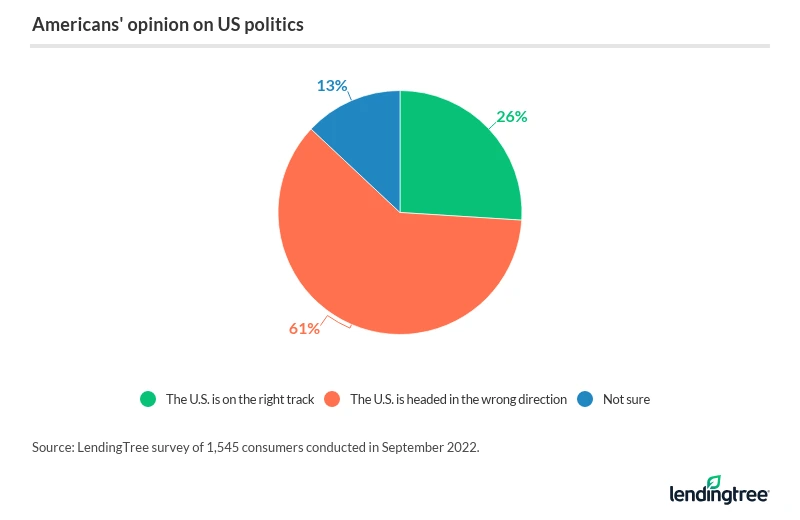
That depends on who you ask, though. The youngest group of possible voters are the least likely to say the U.S. is headed in the right direction, with 15% of Gen Zers ages 18 to 25 holding this belief. Alternatively, millennials ages 26 to 41 are the most likely to say the U.S. is headed in the right direction at 33%. However, a majority of the members of each generation still maintain that the U.S. is headed in the wrong direction.
By political party, 86% of Republicans say the U.S. is headed in the wrong direction, followed by 68% of independents and 39% of Democrats. On the other hand, 47% of Democrats say the U.S. is headed in the right direction, while just 9% of Republicans agree.
Americans are slightly more confident in their state. Overall, 39% of consumers feel their state is headed in the right direction politically, though men (46%) are significantly more likely to feel this way than women (33%). By political affiliation, 54% of Democrats think their state is heading in the right direction, while 52% of independents and 48% of Republicans think their state is heading in the wrong direction.
This comes as consumers are most likely to consider their political views as moderate. To break it down:
- 41% say they’re moderate.
- 34% say they’re conservative.
- 25% say they’re liberal.
By generation, baby boomers ages 57 to 76 are the most likely to identify as conservatives, at 42%. Gen Zers, on the other hand, are the least likely, at 29%. Meanwhile, millennials are the most likely to identify as liberal, at 29%.
With Republicans the most likely group to say the country is off track politically, more Americans are shifting toward increasingly conservative beliefs. Although nearly half (49%) of Americans say their political opinions haven’t changed over the past two years, 19% say they’ve become more conservative. That’s particularly true for consumers earning between $50,000 and $74,999 annually. Of this group, a quarter (25%) say they’ve become more conservative.
Some Americans’ indifference toward political parties is also evident, as 18% say they’re leaning more toward independent or unaffiliated political beliefs. The lowest-earning consumers are the most likely to feel this way — 1 in 5 (20%) of those with household incomes below $35,000 say they’ve become more independent or unaffiliated. Comparatively, just 15% of consumers say they’re more liberal than two years ago.
15% have considered leaving the U.S. due to politics
If you’ve ever been caught in a heated political discussion, you might’ve heard the phrase, “If you don’t like it, you can move.” As it turns out, some consumers have seriously considered it. In fact, 15% of Americans have considered leaving the country because of the political climate. Another 13% say they’ve told others they were thinking about it but never seriously considered it.
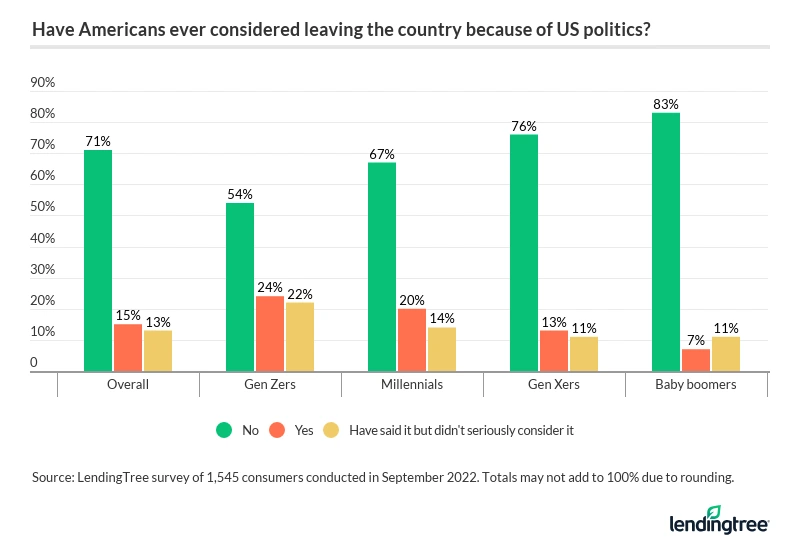
Almost a quarter of Gen Zers (24%) say they’ve considered leaving the U.S. because of national politics, making them the most likely age group to say so. Meanwhile, baby boomers are the most likely to stay where they are, with 83% reporting they’ve never considered it.
By political affiliation, independents (18%) and Democrats (17%) are the most likely to consider moving. Republicans would rather stay within the country, though, as 78% of this group say they’ve never considered leaving the country due to politics.
What kind of an impact could that have on the U.S. housing market? According to LendingTree senior economist Jacob Channel, it has the potential to make a large dent in demand.
“There are about 258 million adults in the U.S., so if 15% of them decided to leave, that would mean 38.7 million people would no longer be around to buy homes or otherwise stimulate the economy,” Channel says. “This would have a profound impact on the housing market. We’d almost certainly end up with way more housing supply than demand, and home prices would probably plummet.”
Realistically speaking, many of the 38.7 million Americans who considered leaving won’t make the move, so Channel is skeptical of any potential impact on the housing market. But it’s worth sharing the could’ve, would’ve, should’ve.
Moving within the country may be more realistic
Some Americans may be dreaming of a life abroad, but a larger portion would feel content in another part of the country. Overall, nearly 2 in 5 (39%) Americans say they’ve moved or might consider moving to a new area if their political views didn’t align with the majority.
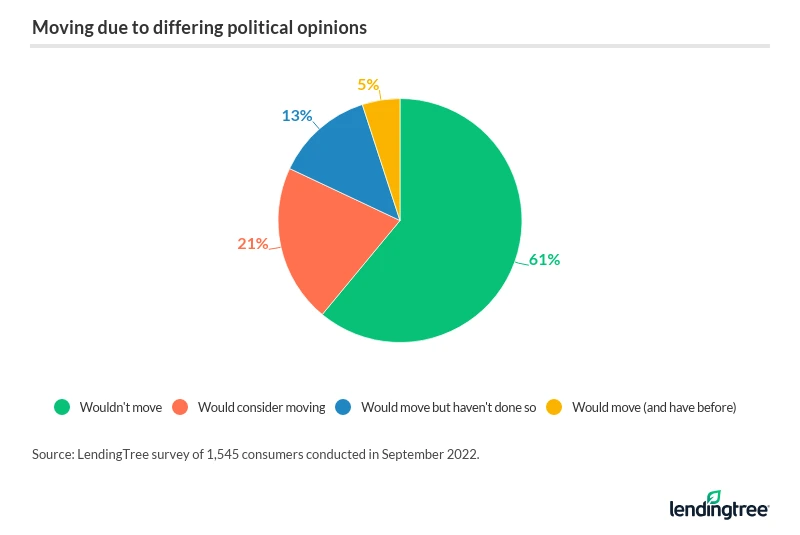
Once again, Gen Zers are the most likely to pack it up, with 55% saying they would at least consider moving to a different city or state. Baby boomers would still rather stay, as nearly 71% of this age group say they haven’t considered moving to a new area due to politics.
Most of those who’d move would likely cross state lines. Among those who say they’d move due to political views, 59% say state politics would impact their decision. Following that, 36% say local politics would play a role, while 30% would move within the country due to national politics.
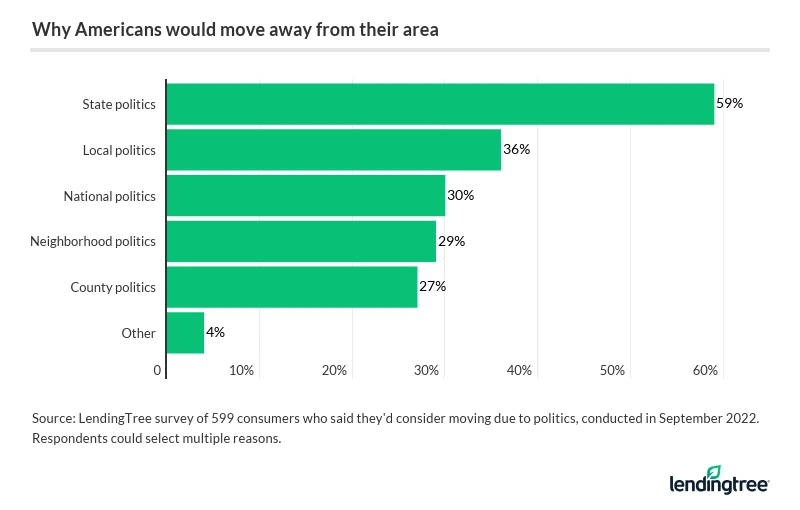
Channel says it’s more likely these potential movers would impact the market.
“If large numbers of people were to move from rural to urban areas or vice versa, it could overtax housing markets that see big influxes of new residents and push home prices up,” he says. “On the other hand, areas that lose current residents and don’t attract new ones could see prices decline as housing supply increases.”
Ultimately, Channel doesn’t believe politics alone will be enough of a reason to convince people to move. If anything, he says growing remote work options and rising home prices in major urban areas will probably have a more profound impact. Still, if people from urban areas continue to move to more rural ones, those areas could become more expensive and more left-leaning politically — though he says that’s a big “if.”
Meanwhile, 35% would move to a place with different political views — here’s why
While many Americans would skip town to be with like-minded peers, a similarly high percentage wouldn’t mind being the odd one out. In fact, 35% say they’ve moved — or would consider moving — to an area because their political beliefs differ from the majority.
State politics is the driving factor here, too. Of those who’d at least consider moving, 53% cite state politics as the reason for it. Following that, consumers who’d at least consider moving would be most impacted by:
- Local politics (35%)
- Neighborhood politics (32%)
- County politics (29%)
- National politics (25%)
Regardless of whether they’ve considered moving due to politics, 2 in 5 (40%) Americans say they’d move to a place where their political beliefs differed from the majority because they believe their vote would carry more weight.
At least 4 in 10 are cautious about externally displaying political views
It may feel like political signs, flags and other external displays of political views are more common than ever, but a large portion of consumers say they’re cautious about displaying their beliefs. Overall, 41% of respondents say they’ve worried about being ostracized or experiencing other versions of retaliation (such as vandalism or theft) for sharing their political opinions via external endorsements.
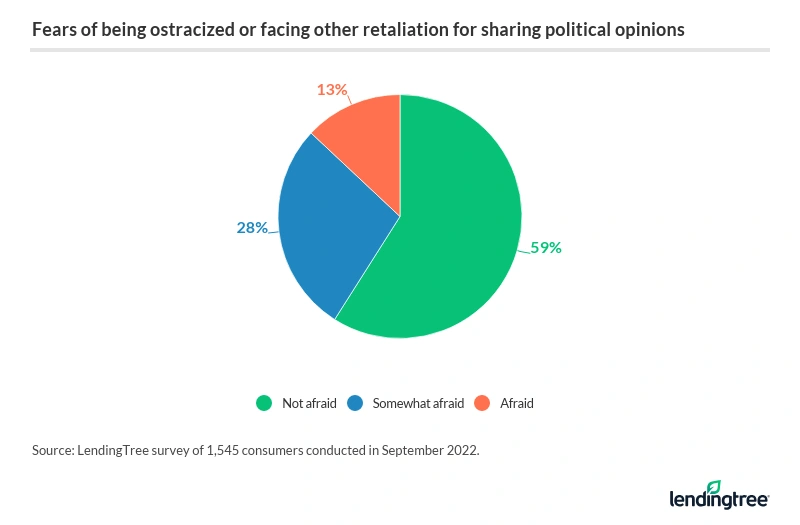
Some of those fears are well-founded — particularly for those looking to sell their home. If you’re a seller, Channel says your best bet is to make that home as appealing to the widest pool of buyers as possible. That means avoiding things like political signs.
“Political signs could absolutely harm a person’s ability to sell their home,” he says. “This is especially true as the housing market cools and buyers become more discerning about which homes they plan on making offers on. If a buyer’s politics don’t align with a seller’s and there are plenty of other houses to choose from, they may opt to find a seller whose views are closer to theirs.”
Looking to move due to politics? Here are a few things to consider about relocating
Like the holidays, the midterm season often brings some heated conversations. For those who feel like the political minority at the dinner table, moving may feel increasingly appealing. Although the political climate may feel particularly frustrating right now, Channel cautions against making any impulsive moves.
“Moving on a whim may seem like a good idea, but it often doesn’t pan out,” he says. “Remember that just because the grass seems greener on the other side of the fence doesn’t mean it is. If you move without proper consideration, you could end up filled with regret and out thousands of dollars.”
For homeowners looking to relocate, Channel offers the following advice:
- Be sure you have plenty of savings. “Moving isn’t cheap, especially if you’re planning on going far,” Channel says. “As a result, you’ll want to save up as much as you can so that you can cover common expenses like movers or new furniture.”
- Learn the market you’re planning on moving to, and be sure you’re giving your move proper consideration before you pack your bags. “By familiarizing yourself with an area you want to move to, you can better prepare yourself for the kind of things you’ll need upon your arrival,” Channel says. “For example, if you want to move out of the country, you’ll want to know and have the proper forms and documents that you’ll need ahead of time.”
- Seriously, do your research. Even if you’re not planning on going far, Channel says you’ll want to have a decent sense of what your destination is like before you move there. Getting a sense of what your monthly mortgage payments would look like will prevent you from being overwhelmed by things like hot housing prices and give you a sense of how much you’ll need to save up to make your move.
Methodology
LendingTree commissioned Qualtrics to conduct an online survey of 1,545 U.S. consumers ages 18 to 76 from Sept. 20 to 23, 2022. The survey was administered using a nonprobability-based sample, and quotas were used to ensure the sample base represented the overall population. All responses were reviewed by researchers for quality control.
We defined generations as the following ages in 2022:
- Generation Z: 18 to 25
- Millennial: 26 to 41
- Generation X: 42 to 56
- Baby boomer: 57 to 76
View mortgage loan offers from up to 5 lenders in minutes

